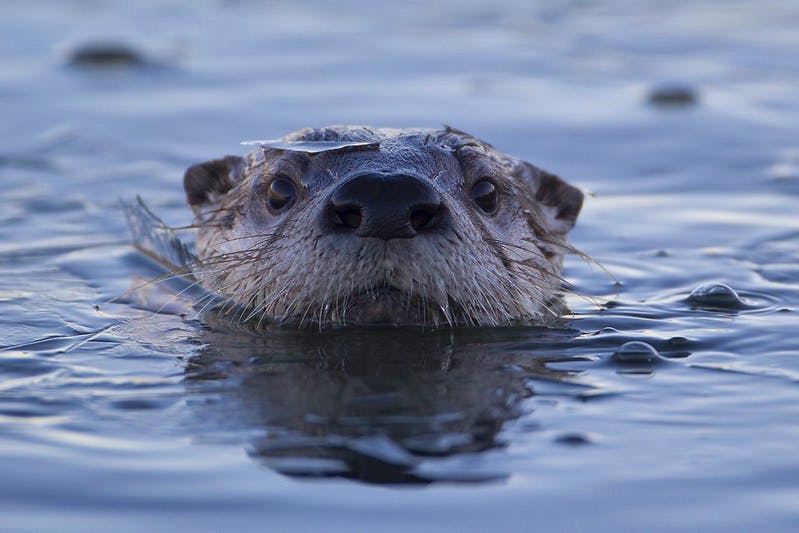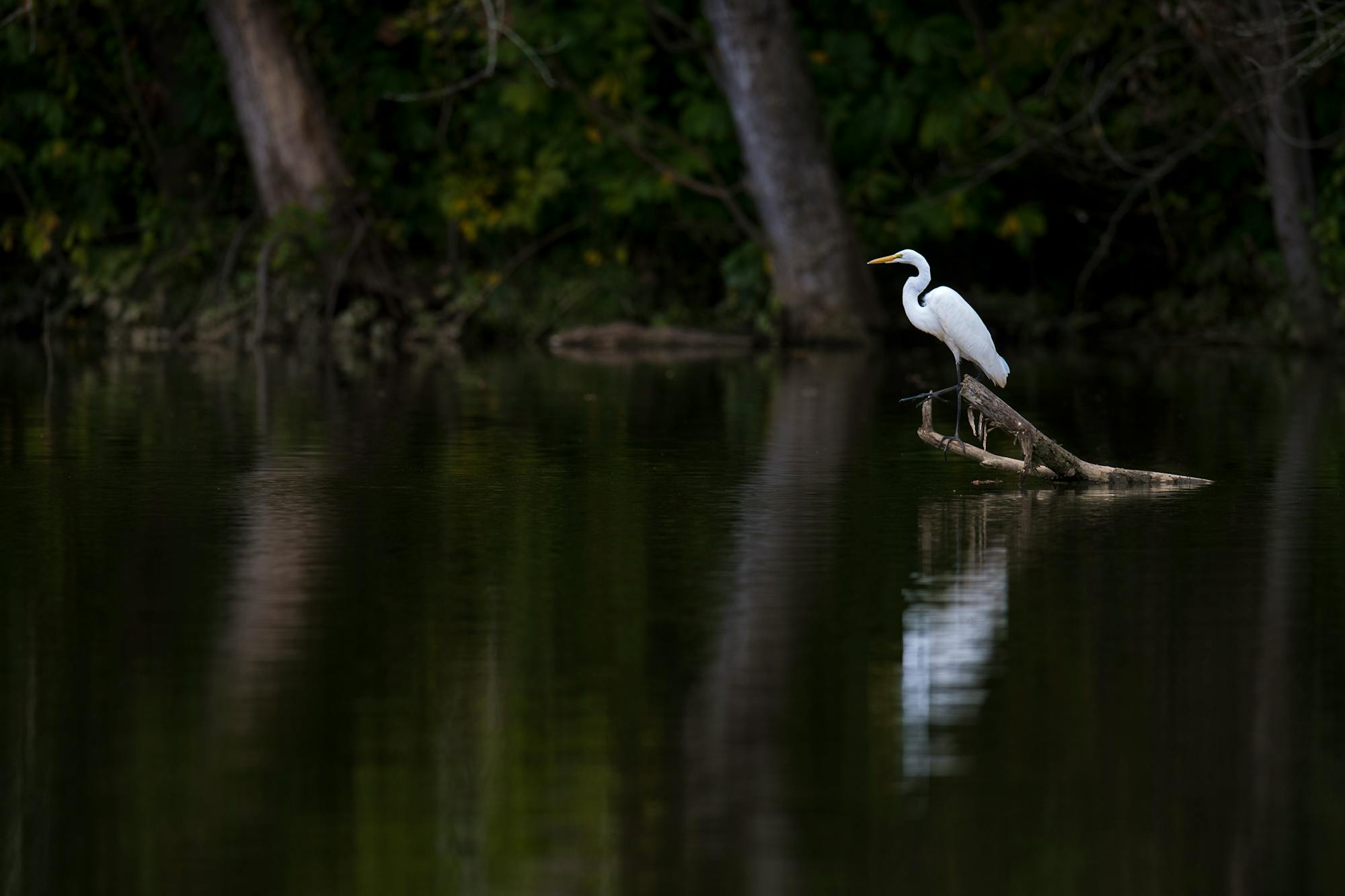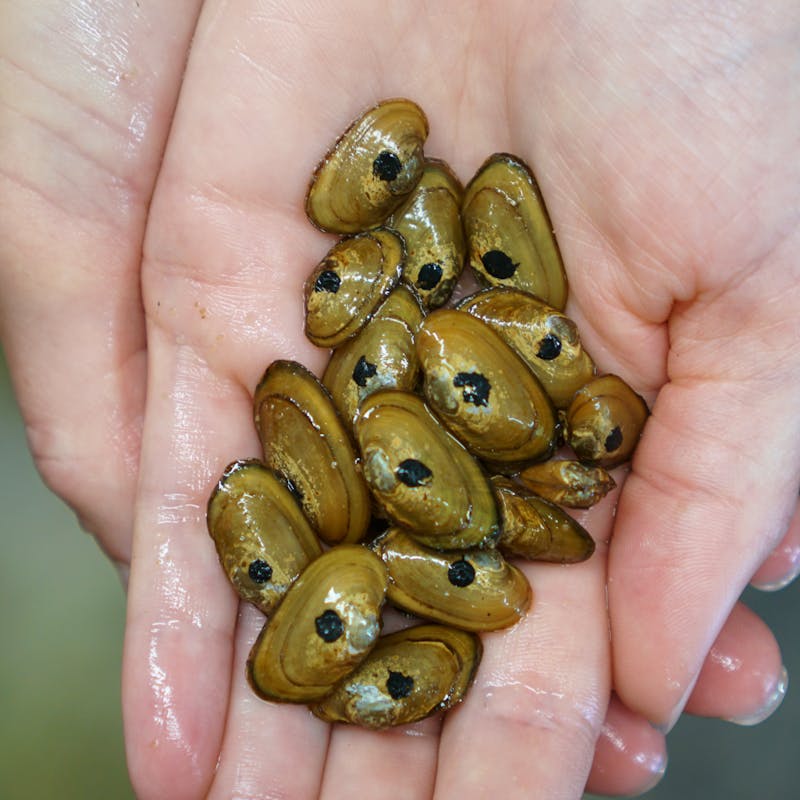Atlantic pigtoe, Carolina heelsplitter and Appalachian monkeyface are some of the distinctive names of freshwater mussel species scattered throughout waterways in every U.S. state except for Hawaii. You can catch glimpses of their gleaming shells nestled within the sandy bottom surfaces of rivers, streams, creeks and lakes. The role of these small mollusks may be overlooked, but freshwater mussels fulfill a variety of important ecological needs.
Otters, egrets, racoons and a variety of other animals rely on freshwater mussels for food, and they are also important “ecosystem engineers.” When their shells stack together to create an underlying layer, or substrate, on the bottom of a river or stream, algae and other organisms attach themselves to these blocks and attract fish that feed on them. Freshwater mussels also act as a powerful water filter: A single mussel can purify up to 20 gallons of water per day! The composition of entire waterways including appearance and even smell changes if freshwater mussels are not present to create favorable habitat conditions.



Despite their importance, the U.S. Fish and Wildlife Service estimates that of the 300 species of freshwater mussels found in the United States, around 70% are either extinct, endangered or in need of special protection. This resulted from overexploitation from the pearl button industry - although this practice ended in the 1950s - and more recently from dams and dredging, sediment suspension from erosion interfering with mussel feeding and reproduction, and an influx of pollutants creating toxic environments lacking oxygen.
Over the last 30 years, mussels - which are important indicators of the health of entire ecosystems - have declined drastically. Certain mussel species throughout the United States are experiencing an “apocalypse” and researchers are bewildered as to the potential cause. Any mass mortality spikes are potential evidence of poor water quality, an indicator that the contaminants are too toxic for mussels to process.
One of the problems is the correlation between areas of high coal ash discharge—a sludge waste product created from coal combustion —and the decline of mussel populations. Defenders partnered with the Sierra Club and the Environmental Integrity Project to announce intent to sue the Environmental Protection Agency in 2009 for violating Clean Water Act protections and failing to restrict coal ash discharges nationwide. Federal law required the EPA to revisit power plant discharge regulations annually yet there had been no updated decision-making from the agency since 1982 on this issue. The EPA ultimately agreed to revisit wastewater standards to issue a ruling in 2012 establishing limits on toxic metal discharges. Despite this, coal ash discharge remains a relevant concern as under the Trump administration 2015 regulations prohibiting the dumping of bottom ash wastewater entirely were weakened to instead allow 10% of the process water to be discharged daily.
Another problem is invasive species, which outcompete native freshwater mussels. Rapidly expanding invasive zebra and quagga mussels - native to Eastern Europe but first transported to the United States Great Lakes region in the 1980s from ships discharging ballast water - are catastrophic to local waterways because they are more resilient to temperature shifts and they are quick to reproduce. Their uncontrolled growth increases water acidity and decreases oxygen levels. These invasive species also attach to boating equipment that then unintentionally spread them to other waterways. Their sharp outer shells are spreading over beaches, and they are clogging water intake systems such as drains and pipes.
The 1972 Clean Water Act provided visible improvements to the water quality of waterways nationwide, proving that compliance and preventative measures are necessary. When legislation isn’t enforced, it’s necessary to pursue legal action to hold the government accountable. Defenders joined a lawsuit in April 2020 to sue the Trump administration after it reversed established protections for wetlands and streams in the South that fall under the jurisdiction of the Clean Water Act.
But legal mechanisms alone won't be enough to ensure that all native mussel species can recover. Communities have a collective responsibility to increase the effectiveness of these measures through responsible environmental practices. To help prevent the spread of invasive mussel species, everyone can – and needs to – play a role. This includes practicing good boat hygiene by cleaning and properly drying all equipment, including motors and trailers. Cutting down on pesticide use on lawns and removing any exposed garbage or contaminants to prevent urban runoff into local watersheds. Adding more plants to garden spaces also helps control erosion and keeps water clean. Individual actions have a big impact, and everyone has the power to educate others on the ongoing freshwater mussel crisis below the surface—because if freshwater mussels disappear, so could the various fish, mammals and plants that rely on them. It’s time to start recognizing the incredible importance of these tiny bivalves that protect our waterways.











